Drinking regime of a pregnant woman: we monitor the water balance, do not abuse mineral water and replace coffee and tea with tizans
Having learned about pregnancy, the expectant mother almost always revises her diet. Sausages, smoked meats, sweet and salty snacks, fast food and semi-finished products are put into the firebox. Just as picky as to food, you need to treat drinks. You will have to give up many of the usual drinking options, and in some ways you will need to significantly limit yourself. What liquids can and should be drunk by a pregnant woman, and what is now prohibited before the birth of a baby, read our material.
How much should a pregnant woman drink
Mastkhev for a pregnant woman is drinking water without gas with a safe chemical composition. It does not stay in the body, like other fluids, does not load the kidneys, and is optimal for the endocrine and cardiovascular systems. You can drink mineral water without gas, but when choosing it, carefully read the label. Mineral water for pregnant women is allowed. In addition, it relieves the unpleasant symptoms of toxicosis better than the usual one. But medical-dining room, and even more so, medicinal water is something that should not be bought without consulting a doctor.
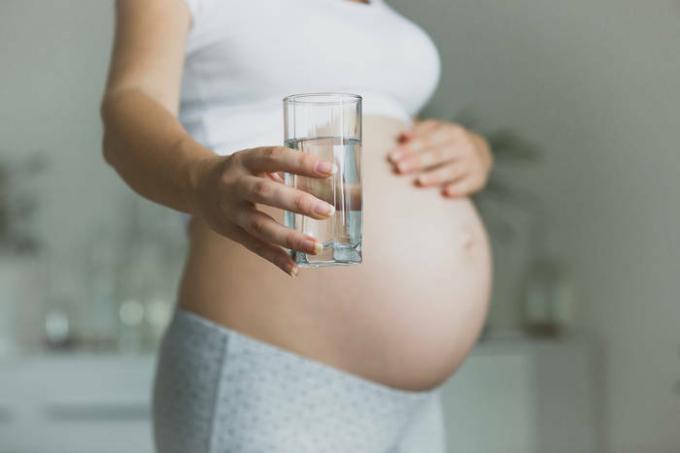
The amount of water you need per day depends on the length of your pregnancy / istockphoto.com
In the first trimester, when a woman is often tormented by toxicosis, you can (and should!) Drink as much water as you want. The total volume of fluid consumed must be brought to 2.5 liters per day, of which at least a liter must be water. The rest is tea, first courses, juicy fruits and vegetables. Starting from 20 weeks, the rate of blood circulation in a woman's body increases by 40%. Because of this, the metabolism is accelerated, and the liquid is excreted much faster. The urge to go to the toilet overtakes the expectant mother in the most unexpected places. At this time, doctors recommend reducing the volume of fluid to 1.5 liters per day (again, water should account for at least half).
What can a pregnant woman drink
In addition to water, pregnant women are allowed not so little. First, these are natural juices. Note, however, that we are talking about freshly squeezed juices. It is not recommended to replace them with juices from packages (even if they are directly squeezed and without preservatives, as it is written on the package). In fact, useful microelements, due to which the expectant mother most often drinks juice, are contained only in freshly squeezed juice. It has been proven that within 20 minutes after pressing the juice loses up to 45% of its vitamin properties. Do not forget that the use of freshly squeezed juices has its own rules. You need to drink them on an empty stomach, about half an hour before meals. It is better to drink sweet fruit juices before lunch, and vegetable juices, on the contrary, in the afternoon.
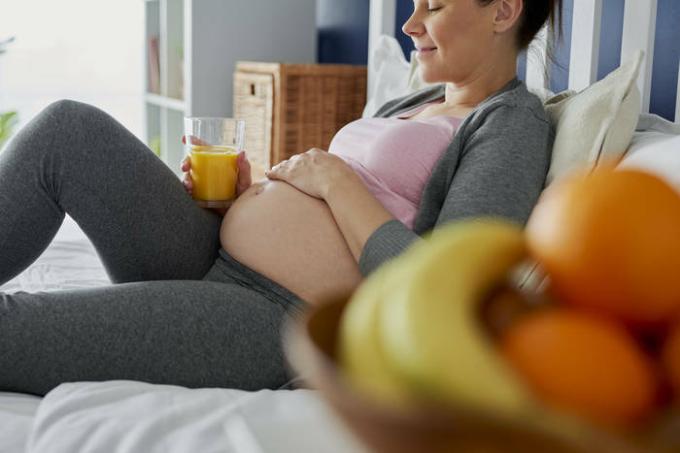
It is better to replace packaged juices with freshly squeezed / istockphoto.com
Now, while seasonal fruits are not yet on sale, and last year's apples have lost their vitamins, juices can be replaced with fruit drinks and compotes. It is best to use home freezing for this: it is enough to bring berries and fruits from the freezer to a boil and leave to infuse for several hours. This drink contains fewer vitamins than natural juice. But it does a great job at relieving thirst. Most importantly, do not overuse sugar. It is better to cook compote without it at all and, if necessary, sweeten it with a drop of honey.
The third drink that pregnant women can drink is tizan. So now it is customary to call herbal teas caffeine-free. They can be bought at the pharmacy in ready-made bags for a one-time brewing, but it is better to take the herb in bulk and brew like tea - an incomplete teaspoon of herb in a glass of boiling water. One of the most useful herbal teas for pregnant women is raspberry leaf tea. It is an excellent antioxidant and also contains B and C vitamins, potassium, magnesium, phosphorus and iron. Also, pregnant women can use chamomile tea, which has a good effect on the nervous system and has an anti-inflammatory effect. Rosehip tea is very rich in ascorbic acid, in the first trimester it relieves toxicosis well, relieves kidney function and normalizes blood pressure. But it is better to drink mint teas in dosage: infusions from this plant in the later stages can provoke a contraction of the uterus.
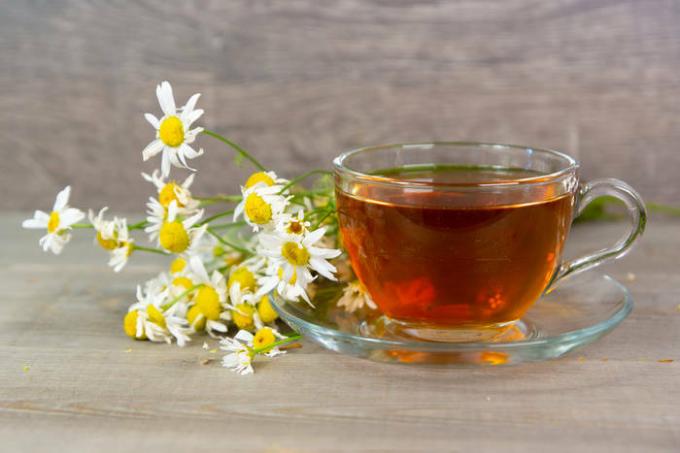
Tizans can be alternated with virtually no limit / istockphoto.com
Rooibos (red tea made from aspalatus leaves with a rich sweetish taste and woody flavor) are also considered safe tizans for pregnant women, hibiscus flower tea, kuqiao (Taiwanese buckwheat tea), anchan (Thai tea made from blue herbaceous vine buds) and our Slavic blooming Sally. However, all these drinks must be alternated with each other, without getting carried away by one thing and not replacing water with teas.
What a pregnant woman shouldn't drink
The list of prohibitions should probably start not with coffee, but with sweets carbonated drinks. This is something that in an amicable way should not be consumed by either adults, or children, and even more so, pregnant women. Not only do these drinks contain a killer dose of sugar and chemical flavors. Soda causes flatulence (excess gas in the intestines), often causes stomach pain, and interferes with the body's normal absorption of calcium. We will add packaged juices to the same list - although they do not ferment in the intestines, they also contain a lot of excess sugar and preservatives. If you really want a "ready-made" juice - choose at least those that are produced for baby food.
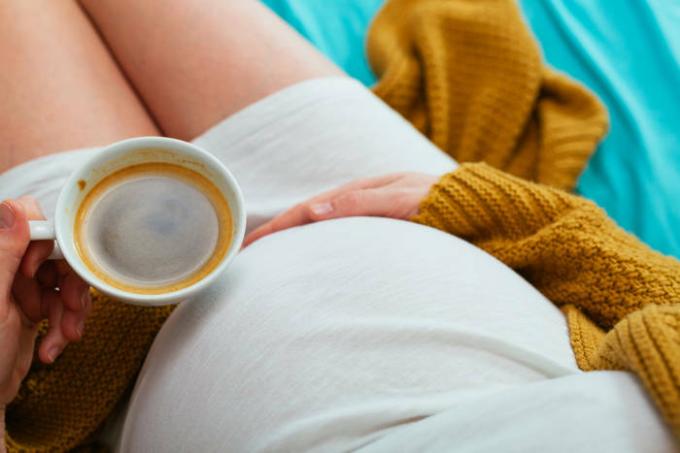
It is better to refuse coffee altogether during pregnancy / istockphoto.com
Ban on coffee for many pregnant women is tantamount to giving up sweets. Indeed, often this drink is not just a hot liquid in a cup, but a small morning ritual that gives a positive attitude for the whole day. If this has any psychological value for a woman, doctors allow one cup of coffee a day, but with reservations. The coffee should be natural, not instant. Drink it with a lot of milk (drinks such as latte or cappuccino are suitable). It is advisable to do this before 12 noon to avoid an invigorating effect for the evening.
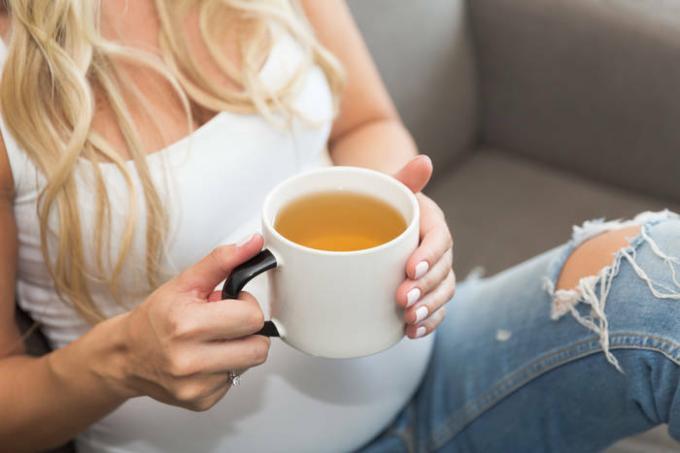
Black and green tea has as much caffeine as coffee / istockphoto.com
Replacing coffee with black or green tea is also not recommended. After all, caffeine (because of which, in fact, coffee is prohibited for pregnant women) is contained there no less. A cup of strongly brewed black tea will “surpass” a glass of latte in terms of caffeine content. Therefore, the replacement is considered equivalent. If you want to drink tea, brew it just barely, so that the water is slightly painted over in a pale color. True, many people find this tea completely tasteless, so it is better to switch to tizans.
You will also be interested to read:
What liquids should a pregnant woman drink in the heat
Why scientists banned pregnant women from drinking tea and coffee
7 main products on the menu of the expectant mother



